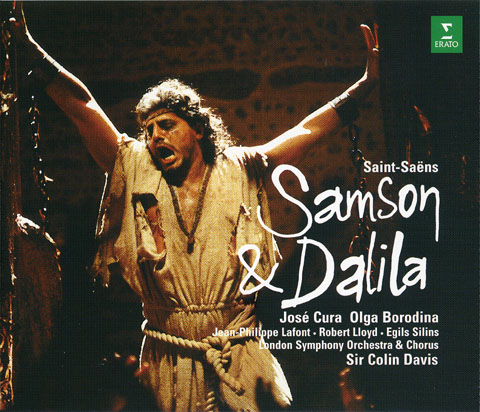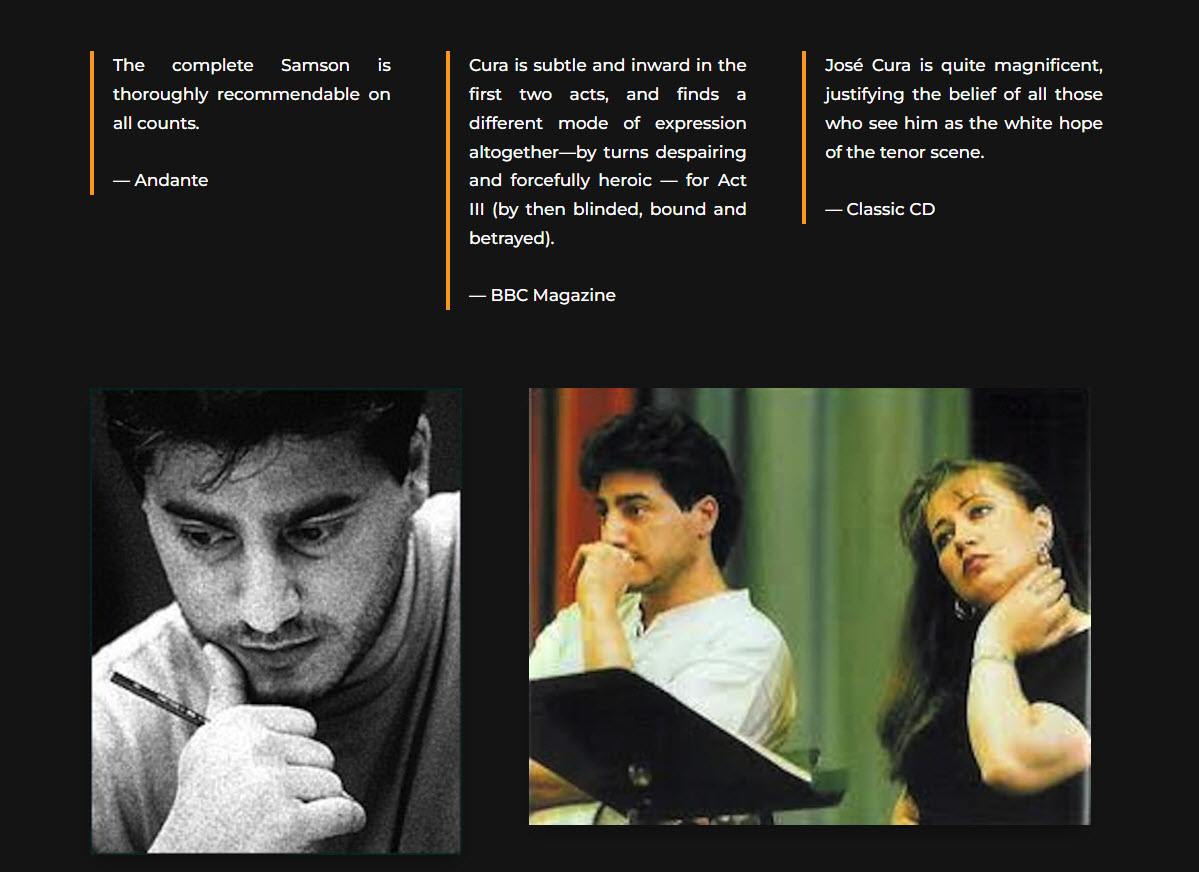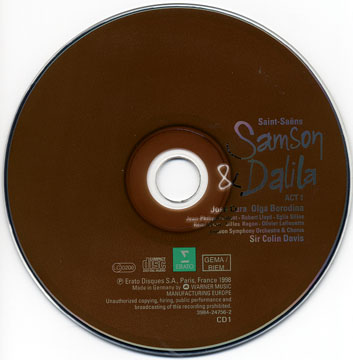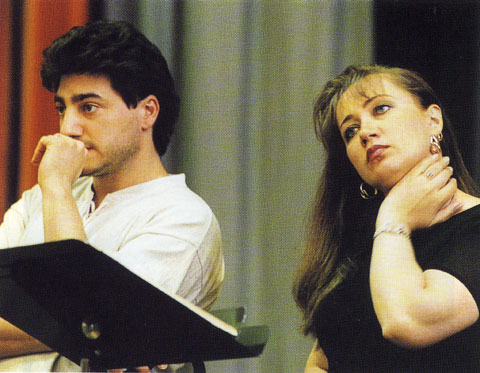'Somewhat
limited in the scope of its story, 'Samson' is the only Saint-Saëns opera to
have survived in the repertoire, as well as one of the few by any Frenchman.
Indeed, its biblical subject matter retarded its arrival in Paris until
1892, 15 years after Liszt had recognized its considerable musical merits
and had facilitated its world debut in Weimar. These merits include a
well-shaped seduction scene between the two title characters in the second
act, as well as moments of wrath for Dalila and agony for Samson outside of
this encounter. Both Cura's and Borodina's voices impressively depict this
spectrum of emotions. Cura has a muscular tenor matching his physique,
strongest at the top of his range, and a good actor's depth of
characterization, while Borodina displays a heady mix of richness and
delicacy in her soprano. Lafont credibly depicts a bigoted, wrathful zealot,
Lloyd a sweet basso veteran. Much of the melodically loveliest music seems
to belong to the Philistine women, sung entrancingly here by the chorus, and
Davis gets the greatest possible drama through careful pacing and
highlighted dynamics.' CDConnection
'José
Cura is a world-class Samson. His powerfully masculine tenor, dark in
timbre, ardent but never self-indulgent, has earned the young Argentinian a
deserved reputation as a successor to Domingo. There is a thrill in his
voice, a presence even on disc, which gives the uninitiated a sense of the
committed, affecting impression he must make onstage. Cura sings with a
genuine sense of discovery, and he shades his performance beautifully. The
hushed desolation he projects as the blinded, enslaved Samson is a poignant
surprise after the virile hero-lover....' Joanne Sydney Lessner, Opera
News, February
1999
'And the climax of "mon coeur s'ouvre a ta voix"
is surely one of the steamiest scenes captured on disc, though its sexiness
has nothing to do with buff physiques and everything to do with gutsy,
compelling musicianship... from Cura, the half tints of an heroic voice
breathless with longing, caressing Saint-Saëns sinuous vocal lines, surging
in to an exultant B-flat that speaks as much of erotic rapture as it does
of a tenor nailing his money note.'
Marion Lignana Rosenberg, American Record Guide,
Sep-Oct 1999
'Where Samson is concerned Cura provides the
truly heroic timbre and dramatic declamation his part requires, and he is as
sensitive as perhaps any Samson on disc, especially in Act 3 where he sings Vois
ma misere, and the asides while taunted by Delilah later on, in a mezza
voce as if communing with himself. In Act 2 he responds to her false
expressions of love with true passion in his tone.' Alan Blyth,
Gramophone, January 1999
'...Cura is the real thing, one of the most
thrilling voices of this or any other generation and an artist of immense
promise. San Francisco Opera fans discovered him early, as Don Jose in
"Carmen." Now here he is in another of French opera's towering roles, and
his interpretation ranks him with the best Samsons on record....The tenor's
phrasing boasts the sort of natural ease that was more common before World
War II, with ideal breath support dramatically deployed and a way of shaping
words that is nothing short of miraculous.' Octavio Roca, San Francisco
Chronicle, December 1998
'Cura is subtle and inward in the first two
acts, and finds a different mode of expression altogether--by turns
despairing and forcefully heroic -- for Act III (by then blinded, bound and
betrayed).' Stephen Maddock, BBC Magazine, February 1999
'José Cura is quite magnificent, justifying the
belief of all those who see him as the white hope of the tenor scene. He
not only sounds like a hero, strong and intense, he also sings with subtlety
and the large dynamic range that one expects in this role. His responses to
Dalila in the climatic love scene are sung with astonishing refinement and
restraint, all the more effective in the context of the steam coming off
Dalila's tone.' Michael Tanner, Classic CD, February 1999
'The cast is exceptional. José
Cura, the latest
Puccini tenor to come along, gives an intense performance as Samson.
Throughout Acts I and II, Cura compels listening, and easily communicates
the Israelite hero's emotional turmoil, troubled by his love of God and
country, and his feelings for Dalila. Cura's musicianship is first-rate,
and he works hard at vocal nuance.' Robert Workmon, Journal Now
'Samson et Dalila is
having a renaissance, and not because it's great music. Though there are
patches of seductive stuff, the opera is being pressed into service for the
growing number of acclaimed mezzo-sopranos, since the role of Dalila is one
of the few 19th-century star vehicles for that voice type. This recording
boasts the vocally resplendent Russian mezzo Olga Borodina, but tenor José
Cura is the dominant presence, heard here in his strongest operatic
recording yet. While his voice has been known to go slack at lower volumes,
he seems uniformly secure. His characterization also has all the necessary
heroism, along with thoughtful, touching pianissimos after Samson loses his
strength. ... [C]onductor Colin Davis, the real star of the set, gives this
opera the same shimmering aura of his great Berlioz interpretations, as if
this were a poor man's Les Troyens. Shimmer comes courtesy of the
fine London Symphony Orchestra and the slightly-too-reverberant recording
venue, Walthamstow Assembly Hall.' David Patrick Stearns
'The complete Samson is
thoroughly recommendable on all counts.' Marc Mandel, Andante
The Maturing
of José Cura
The
Argentinean has recorded Samson et Dalila under the direction of Sir Colin
Davis. Cura proves authoritative and decisive. The Russian Olga Borodina
excels as Dalila.
Armando M. Rapallo
Wednesday, December 23, 1998
Buenos Aires, Argentina
 After
his successful recordings devoted to the works of Puccini—with Plácido
Domingo as mentor and conductor—and to selections of the Argentine
repertoire (Anhelo), José Cura, the tenor from Rosario, has now tackled his
first complete opera in a studio setting with Samson et Dalila, the most
outstanding work of Camille Saint-Saëns, recording it between July 21 and 27
of this year at London’s Walthamstow Assembly Hall.
After
his successful recordings devoted to the works of Puccini—with Plácido
Domingo as mentor and conductor—and to selections of the Argentine
repertoire (Anhelo), José Cura, the tenor from Rosario, has now tackled his
first complete opera in a studio setting with Samson et Dalila, the most
outstanding work of Camille Saint-Saëns, recording it between July 21 and 27
of this year at London’s Walthamstow Assembly Hall.
Cura talked
with Clarín on the same day that he completed the recording
sessions—conducted by the Englishman Sir Colin Davis—expressing his
satisfaction with what had been accomplished. His approach to the recording
underscores again the virtues already exhibited on both his Puccini CD-- a
veritable masterpiece of delivery and diction—and his subsequent CD of
eclectic selections. The difficult role of the Hebrew hero created by
Saint-Saëns based on the libretto of Ferdinand Lemare, is taken on by the
Argentinean tenor with impressive authority, especially if one bears in mind
that his career has been relatively short.
Already in his
first appearance-Arrêtez ô mes frères- Cura’s perfect attack and
stupendous French diction stand out immediately, as do his skillful
inflections in the …donner ma vie and his well-placed high notes at
the beginning of the second act. Striking is the maturity of expression that
he brings to his character’s strange mixture of passions; striking also his
assimilation of text and score. Both demand a tenor with exceptional
lyrical-dramatic traits. Cura introduces the wonderful passage of the
millstone scene in the prison with plaintive accents and restrained vocal
power. His interpretation of Vois ma misère, hélas… is exemplary in
its placement of sound so that a very special atmosphere is achieved by the
time of the final heroic plea in the Philistine temple.
For the
Argentinean artist, this incorporation into the cramped group of recordings
of Saint-Saëns’ work is turning into a huge success. As to his interpretive
style, Cura’s approach to the leading role recalls the great Samson created
by Ramón Vinay (recorded live in 1960 and for those with good memories of
the Colón, his memorable appearance with Sir Thomas Beecham in 1958) while
not detracting in the least from the memories of the great Samsons like Jon
Vickers and Plácido Domingo.
Samson… cannot have a mediocre Dalila. The
Russian singer Olga Borodina is a heroine of excellent vocal
resources and innate expressiveness. From her Amour! Viens aider ma
faiblesse! to the splendid Mon coeur s’ouvre à ta voix, Borodina
offers musical subtlety and a range which-- because of the amplitude and
generous display of vocal ability-- is perfect for the part of Dalila. Sir
Colin Davis’ musical direction is suitable. Concerning the rest of the cast,
the nobility of the singing by English bass Robert Lloyd as the proud Old
Hebrew must be emphasized. (translated
by Monica)






 After
his successful recordings devoted to the works of Puccini—with Plácido
Domingo as mentor and conductor—and to selections of the Argentine
repertoire (Anhelo), José Cura, the tenor from Rosario, has now tackled his
first complete opera in a studio setting with Samson et Dalila, the most
outstanding work of Camille Saint-Saëns, recording it between July 21 and 27
of this year at London’s Walthamstow Assembly Hall.
After
his successful recordings devoted to the works of Puccini—with Plácido
Domingo as mentor and conductor—and to selections of the Argentine
repertoire (Anhelo), José Cura, the tenor from Rosario, has now tackled his
first complete opera in a studio setting with Samson et Dalila, the most
outstanding work of Camille Saint-Saëns, recording it between July 21 and 27
of this year at London’s Walthamstow Assembly Hall.